
 |
||||
|---|---|---|---|---|
| Volume 50 Number 29, August 1, 2020 | ARCHIVE | HOME | JBCENTRE | SUBSCRIBE |
Workers' Weekly Internet Edition: Article Index : ShareThis
Nurses Upsurge Against Pay Injustice:
Nurses and Other Care Workers Are Speaking Out in their Own Name
NHS Workers Say No! to Public Sector Pay InequalityWaltham Forest Save Our NHS:
New Whipps Cross - Fight for the Hospital We Need!Need for Democratic Renewal:
Corruption and Destruction of the Polity Is Now the Name of the GameCommentary:
Gove's Lecture on "The privilege of public service"Workers' Forum:
The Conditions of Many Workers Are Still Fuelling the Pandemic in Britain
PCS Holds Job Cuts Protest as Tate ReopensReparations Rebellion Protests:
Actions to Demand Reparations on Afrikan Emancipation DayUpholding Irish Sovereignty:
British Navy's Dangerous Disregard for Irish Sovereignty Displays Arrogance of the Highest Order
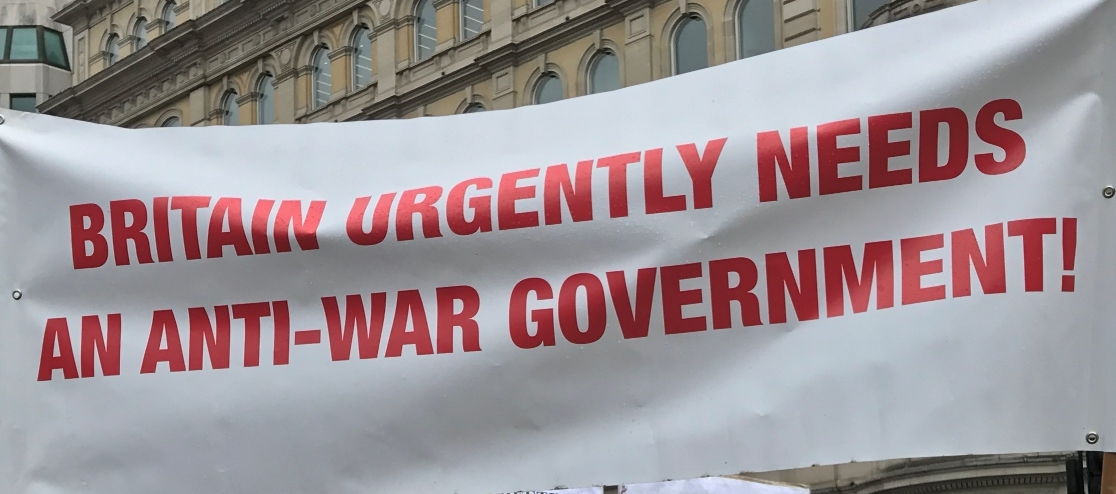
The call for an Anti-War Government with a modern democratic personality in which the people speak in their own name, where deeds and words are one, which does not prioritise military spending over funding health, education, and other programmes for the people's social wellbeing, and which eschews the use of force to settle national and international differences, but instead stands for peace, democracy, justice and progress - this is the essence of the programme of the working class and people of our time.
In contrast, the present government of the cartel parties can be characterised as pro-war. For example, in a recent keynote address, Defence Secretary Ben Wallace suggested that the British government might learn from Turkey's military intervention in Libya.
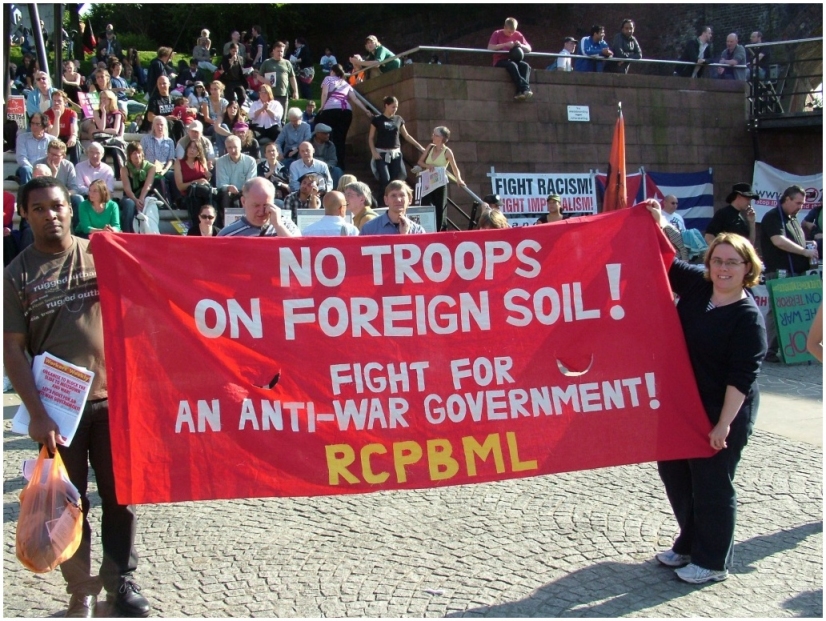
This was mainly a speech designed to justify the British government's development of new forms of warfare including the recent signing of a £65m contract with the US monopoly General Atomics to build Britain's first three Protector drones. The Ministry of Defence is reportedly poised to purchase a total of up to twenty drones. The Defence Secretary approvingly spoke of Turkey's capacity to deploy drones in Syria where he explained the "Assad regime suffered heavy losses", including of 3,000 military personnel. The British government approves of Turkey's intervention in Syria and in Libya.
"Look how Turkey has been operating in Libya where it has used Bayraktar TB-2 UAVs since mid-2019," Ben Wallace said. "Those UAVs (unmanned aerial vehicles) have conducted intelligence, surveillance and reconnaissance and targeting operations against frontlines, supply lines and logistics bases. In July last year they struck the Libyan National Army controlled Jufrah airfield destroying several command and control nodes as well as two transport aircraft."
Turkey is now one of the main interventionist forces in Libya, a country where there has been an ongoing civil war since 2011 when NATO, led by Britain, France and the US, intervened in the country to bring about regime change and the assassination of Libya's political leader Muammar Gaddafi. At that time the British government claimed that it was bringing democracy and stability to the country, but the NATO invasion brought exactly the opposite, an ongoing civil war, as well as a refugee and humanitarian crisis that has spread throughout northern African and engulfed the Mediterranean and southern Europe. Wallace's admiration for Turkey's intervention in Libya shows that the current government is continuing to support external interference in that country.
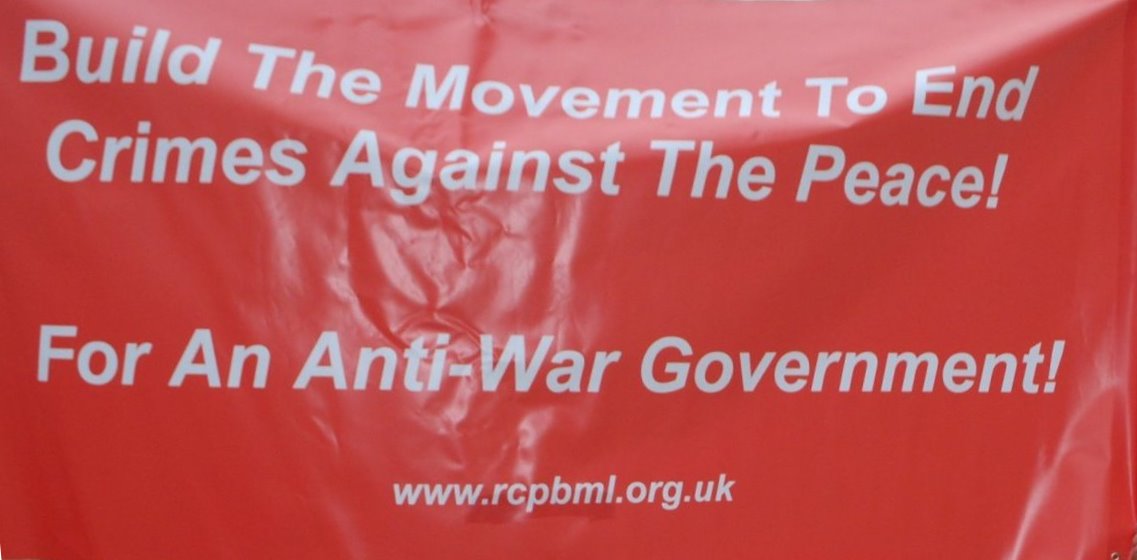
Turkey has emerged as the main military backer of what is referred to as the UN-backed government in Libya, while France, Russia, Saudi Arabia, the UAE, Jordan and Egypt have been the main backers of General Khalifa Haftar, whose forces have been attempting to remove that government by military means. Turkey is just one of the powers supplying arms and mercenaries to the conflict which has led to clear divisions between NATO members and especially between Turkey and France.
Turkey's purchase of an air defence system from Russia has also alarmed some of its NATO allies and led to its expulsion from NATO's stealth fighter programme. Moreover, the widescale use of mercenaries and the importation of weapons into the Libyan conflict by all the interventionists makes a mockery of the UN agreements and arms embargo to which all, including the British government, claim adherence.
The use of Syrian and African mercenaries threatens to further escalate the conflict throughout the region, as does the recent decision of the Egyptian parliament to approve the sending of troops to Libya. It now means that both Turkey and Egypt are openly sanctioning military intervention whilst other powers still do so covertly.
Although this conflict is partly about Libya's oil wealth, it also reflects wider geopolitical struggles which embroil all the major players, with increasing contradictions amongst them. As their contention increases, the peoples of Libya and surrounding countries continue to suffer both from the ongoing civil war and the humanitarian crisis exacerbated by it.
The dire situation in Libya and throughout the region is the result of the meddling and military intervention of Britain and its allies and the warmongering policy of regime change. It demonstrates yet again the need for an Anti-War Government in Britain. Justice- and peace-loving forces are standing against Britain's purchase and use of weapons of mass destruction, against military intervention and all interference in the affairs of other countries, and are demanding that Britain withdraw from the warmongering NATO alliance and that NATO be dismantled.
Let us build the movement for an Anti-War Government in Britain!

On Wednesday, July 29, thousands of nurses and other care and health workers, supported by local health campaigns, and many supporters, marched through London to Downing Street demanding a wage rise and a stop to the attacks on the NHS, with the organisers of the demonstration demanding "No! to public sector inequality and pay justice."
Groups of nurses, health workers and their supporters have organised further marches and rallies for Saturday, August 8, in cities across Britain, including an online rally from 11am-2pm for those that cannot join out of doors. These marches and rallies will be supported by campaigns fighting to safeguard local services and many others.
Nurses and other health workers are speaking in their own name and taking up the fight, both to improve their own pay, and at the same time to take part in the struggle to safeguard the future of the NHS and care services.
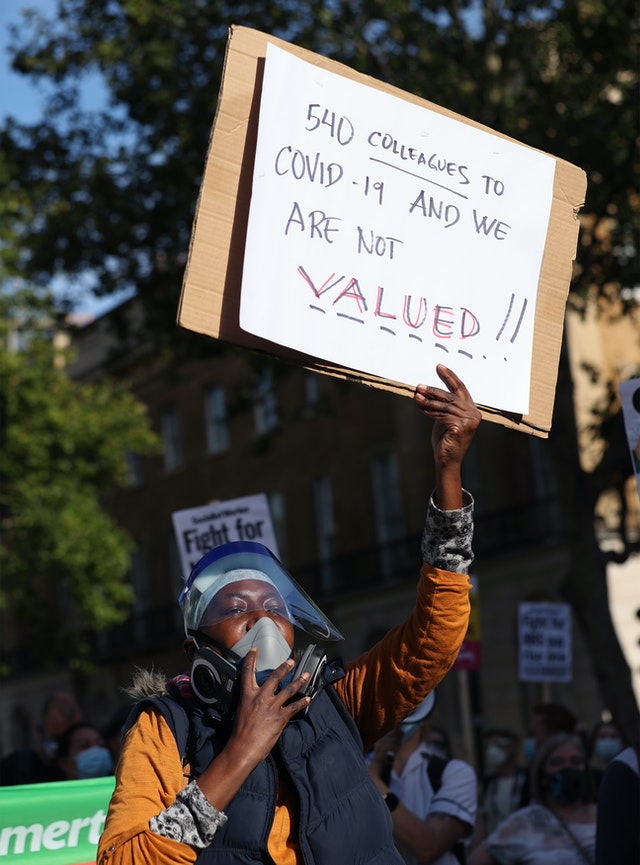
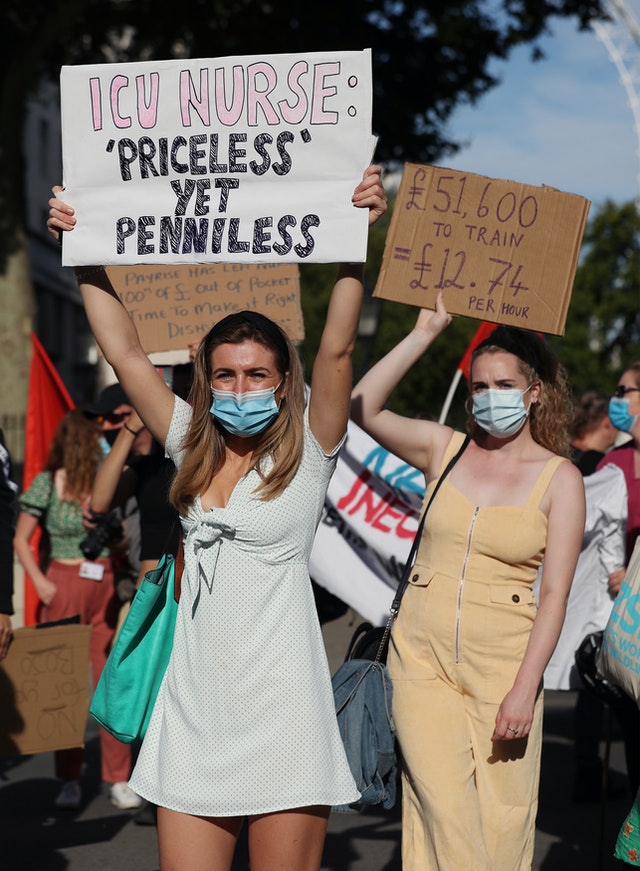

Since the hypocrisy of Boris Johnson and the government has been exposed in clapping health and care workers one day and omitting them from a wage rise the next, nurses have been expressing their anger on social media and in other forums. Now they are taking to the streets, supported by doctors and others, in a series of marches and demonstrations.
Health workers are struggling from the imposition of austerity, as are the working class as a whole. Some are having to use food banks to eat, and struggling to pay their bills after years of real-terms pay cuts finished off by a disastrous three-year low pay deal that again left many more experienced nurses worse off. Nurses have lost as much as 20% of their pay in real terms over the last 10 years. At the same time, they have had to endure constant attacks on the NHS, increased privatisation, staffing cuts, the cutting of student nurse bursaries and the promotion of commercialisation being put above patient care. This has driven many to leave, unable to endure the stress of attempting to deliver patient care to the level they know should be offered to all as of right.


Right from the beginning, nurses, care workers and others in many different groups have made it clear that they support those in public service receiving a wage increase, and they also know that many of these services are also being cut to fund so-called "wage rises". They have also expressed opposition to the Trade Bill and other attacks on the NHS by the government. This is a government that has used the Covid-19 crisis to further line the pockets of private health monopolies and other private companies such as Serco and Deloitte, whilst continuing with planned closures to hospitals and A&Es, together with downgrading services throughout the crisis. These are services that are vital in delivering healthcare to the people, the downgrading of which had resulted in many unnecessary deaths.
The nurses and other care workers are speaking out in their name for a new future that upholds and guarantees their well-being as part of guaranteeing the right of all to healthcare at the highest standard society can achieve. This is not some future dream. This is what the authorities should address now, and nurses and carers should be empowered to make the decisions in the future for a new, human-centred healthcare system.
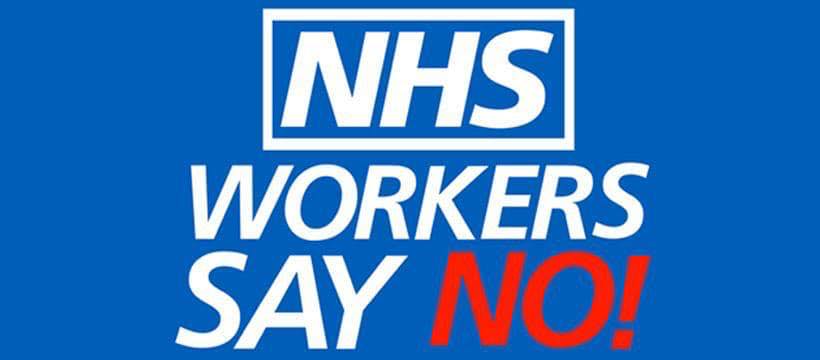
NHS Workers Say No! to Public Sector Pay Inequality
NHS workers across Britain are organising a wave of protests on Saturday, August 8, demanding a 15% pay increase paid from December 1, 2020, in order to start recovering a decade of lost wages, Keep Our NHS Public (KONP) reports.
The organisers say: "We are calling on NHS staff and supporters to join us to send a clear message to the government. We do not accept your plans to exclude us from the public sector pay increase, and we will make ourselves heard until you listen."
An online rally will also be taking place from 11am to 2pm for anyone who cannot join outdoor protests.
For a list of the dozens of events organised across England, Scotland and
Wales, see:
https://keepournhspublic.com/event/nationwide-nhs-workers-say-no-no-to-public-sector-pay-inequality/
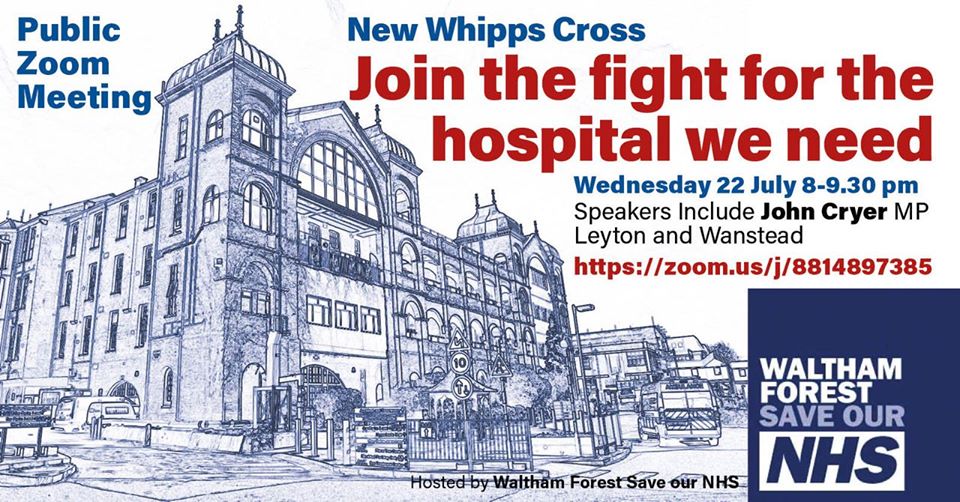
On Wednesday, July 22, the Waltham Forest Save Our NHS (WFSONHS) held a very lively and well-attended Zoom meeting to oppose the reduced number of beds being proposed for the new Whipps Cross hospital.
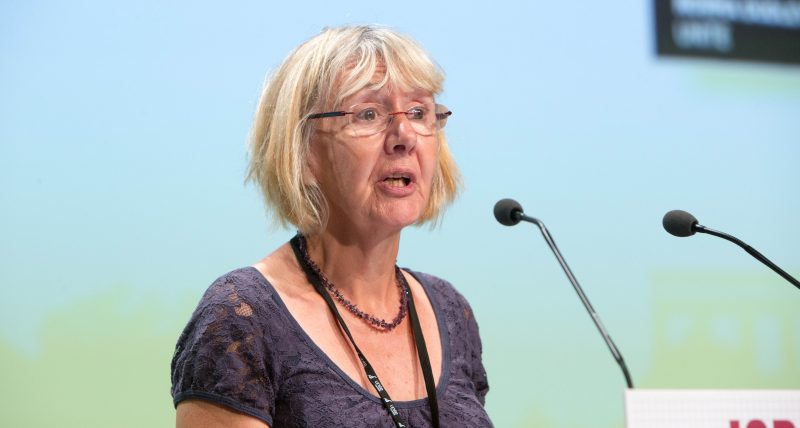
Norma Dudley, who chaired the meeting
The meeting was chaired by Norma Dudley, a retired nurse and WFSONHS campaigner. In her opening remarks she welcomed the participants and praised the very high attendance - over 100 people. She said that while the WFSONHS and the local Waltham Forest community very much welcomed the plans for a much-needed new Whipps Cross hospital there were major concerns about the reductions of beds for the new hospital and concerns about its design and other issues.
The Chair introduced the first speaker, MP for Leyton and Wanstead John Cryer, who has fought for many years for improved health care in his constituency. John Cryer said he welcomed the plans for a new hospital but pointed out it had to be the right hospital - a hospital that would meet the healthcare needs of the community. He was very concerned about the reduction of beds proposed for the new hospital and said that in the past he had fought over the issue of lack of hospital beds proposed for the new Queens hospital to replace Oldchurch Hospital. He pointed out that the occupancy rate at Whipps Cross Hospital during the last two winters had been dangerously high at 100%, explaining that problems start for an occupancy above 80%, and above 90% is at a dangerous level, having an increasingly adverse effect on healthcare.
The next speaker was Charlotte Monro, who has been a union representative and WFSONHS campaigner, linking the campaign with local green organisations. Over many years she has been a tireless fighter for the NHS, campaigned to save Whipps Cross Hospital under threat of downgrading in 2007, and fought a successful campaign for re-instatement after being sacked by Barts NHS Trust for campaigning against cuts in health services in East London.
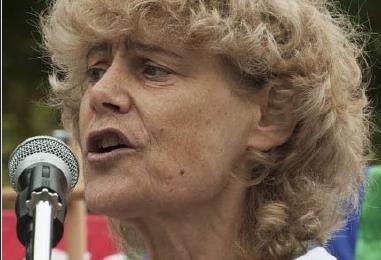
Charlotte Monro, speaking at a rally to save Whipps Cross
Hospital
She gave an eloquent and well-informed speech about the crucial question of environmental issues and climate change in relation to the design and construction of the new hospital. She pointed out that its building and construction should meet the needs of climate reduction and be sustainable to meet the IPCC target to limit global warming to not more than 1.5°C above pre-industrial levels.
She gave the astonishing and shocking statistic that buildings account for 49% of carbon emissions in Britain and that air pollution kills 36,000 people every year. Therefore the construction of the new hospital and the building itself should not add to carbon emissions. The building should take into account where the building materials come from and use low carbon and recycled materials built to last, she explained. Consideration should be given to the shape and orientation of the building, and to the materials, such as those used for the windows, which determine the levels of warming and cooling. Solar panels should be installed, and cooling and heating installations should be from a fossil-free source. She instanced the new Royal Adelaide Hospital in Australia, which had received four stars for its low rate of carbon emissions, as setting an example.
She pointed out that the new building is not just a hospital, but should be a centre for health and wellbeing, with proper consideration given to adequate bed spaces, as well as gardens and trees, which ease stress for patients and greatly aid their recovery. She ended by declaring, "It's our hospital!"
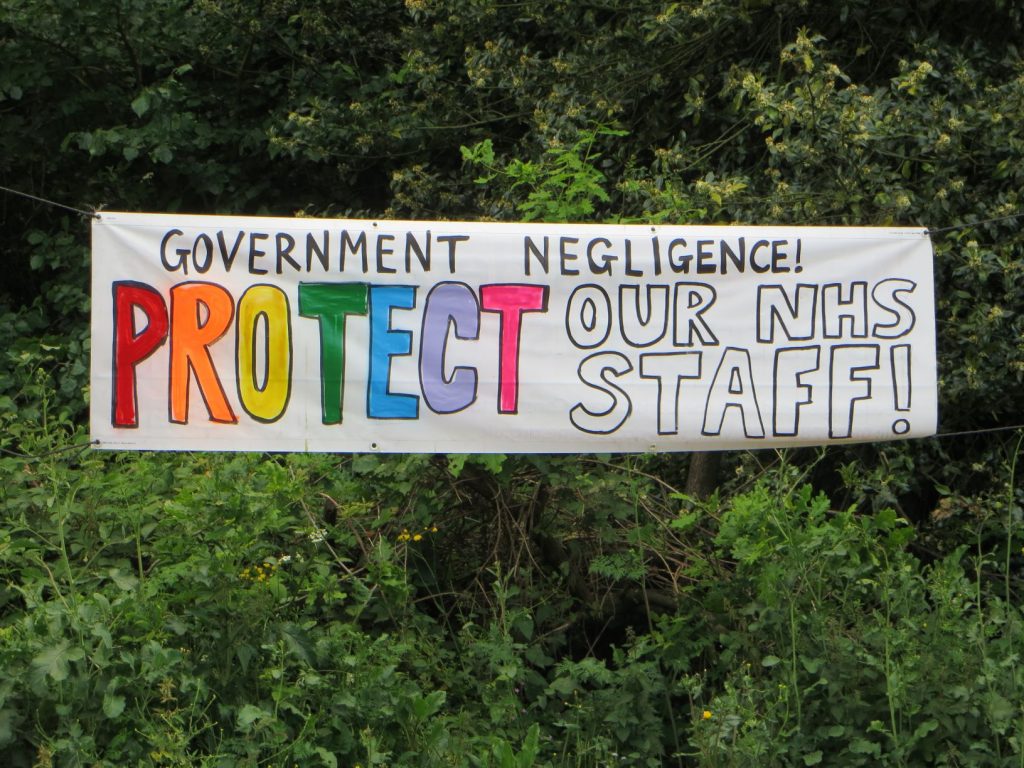
Banner outside Whipps Cross protesting at the lack of
testing and PPE protection for staff during the pandemic.
The last speaker was Mary Burnett, a WFSONHS campaigner. She condemned the 51 fewer beds given in the Barts Trust proposal for the new building and said that a plan for care in the community which is flawed and untested is being relied on by the Trust in its claim that fewer beds are needed, pointing out that the healthcare needs of the elderly would not actually be met. She explained that the new hospital is planned to become a centre of excellence in the care of frail and older people, but the Trust is expecting length of stay to be reduced, although these patients are much more likely to have multiple conditions and need longer in hospital.
She said that the care in the community programme "side steps" actual need in healthcare. She said that the corona pandemic had furthered the use of digital technology, which can work well for some, but will cause huge problems for the elderly and all those who do not have access to computers. She concluded by pointing out that fewer beds would cost lives and called on the WFSONHS to demand a hospital that fulfils the healthcare needs of the community.
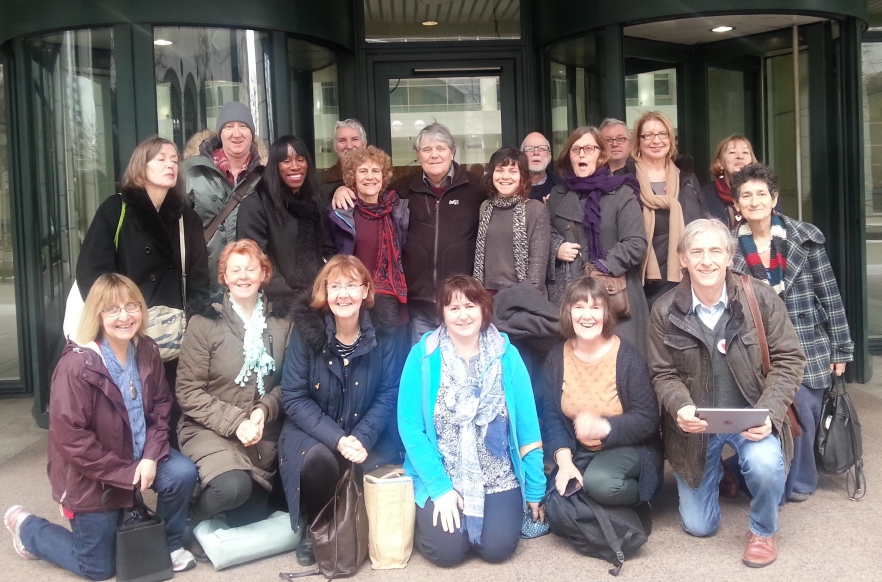
At the Tribunal in the successful fight to re-instate
Charlotte Monro as an occupational therapist at Whipps Cross when she was
unjustly sacked by Barts Trust because of her fight to save services at the
hospital
After the speeches, there were many questions and proposals put forward in the open discussion. In answering questions on bed size reduction, Mary Burnett said that 576 beds were in use in 2018-9 in Whipps Cross Hospital according Barts Trust, but the Trust were now proposing 525 beds for the new hospital. On the issue of social care, she said that it was "being stripped to the bone", while Norma Dudley said it was "a pipe dream rather than reality".
Charlotte Monro said that a large proportion of the proposed £6 million investment in community services is allocated to "health coaches" who would give healthy living advice over the phone as a substitute for proper care, whereas the need is to invest in qualified health workers.
There was discussion on the necessity for adequate public transport to the hospital, which should be both green and adequate. On the issue of selling off hospital land, Norma Dudley said that NHS England was pushing Trusts into doing this; Charlotte Monro said that the pressure to sell the maximum land for housing and maximise housing density would mean that there would be less green space for patients.
The rest of the meeting was discussing the way forward. The Chair asked each of the speakers to give their thinking on this.

Anti-war stand of Whipps Cross staff
John Cryer thanked the WFSONHS for organising the meeting and said that the "care in the community" approach never worked in practice and what was needed was to fight for a hospital that would take into account of the growing population and growing healthcare demand.
Charlotte Monro praised the meeting in showing "the strength we have" and seeking to find ways of pulling the community together, and that the "strength of our voice is our community". She spoke of the need for local green groups to come together to take this up, and urged people to get in contact through the email address shared.
Mary Burnett said that the head of NHS England, Simon Stevens, had said last June that the cuts in hospital beds "had gone too far" and said that therefore pressure should be put on Barts Trust to provide adequate bed size provisions. Not to do so would be "unforgivable and unsafe". She spoke of the need to "get a big campaign going".
The meeting ended with Norma Dudley calling for "a large community campaign throughout Waltham Forest". Charlotte Monro said that the tender for the architects was at present being decided on and therefore the Campaign would need to engage with them straight away: the new building was scheduled to be completed in 2026.
In her concluding remarks, Norma Dudley said that she was pleased so many people had come along. Although Covid-19 made action more difficult, we can put the pressure on saying "the time is now!" and "we need to get moving!", and asked everyone to keep in touch. All community groups, individuals and organisations were urged to keep in touch through the email address: whipps.cross.campaign@gmail.com.

The government is treating the polity as though they were the private owners of the body politic, giving contracts to dubious hedge funds or companies, and taking money with promises of protection of these narrow private interests. In the name of "efficiency", arrangements are being made to pay the rich, and concentrate power in the hands of the executive, an executive which is totally divorced from the political institutions of old where political parties were supposed to be political and represent sections of the body politic.
In the midst of this, in the midst of the "shaking up" of the Civil Service, trying to keep warring factions of the financial oligarchs and big business chiefs in check, while taking the ultimate control of the "special advisors" to the extreme, has come the Russia report.
The House of Commons' Intelligence and Security Committee (ISC) finally published its long-awaited Russia report on July 21. In fact, the ISC was not overly concerned about alleged Russian attempts to "rig" elections and referenda within the United Kingdom, stating that "in terms of the direct threat to elections, we have been informed that the mechanics of the UK's voting system are deemed largely sound". In fact, the report said: "Successive governments have welcomed the [Russian] oligarchs and their money with open arms, providing them with a means of recycling illicit finance through the London 'laundromat', and connections at the highest levels with access to UK companies and political figures."
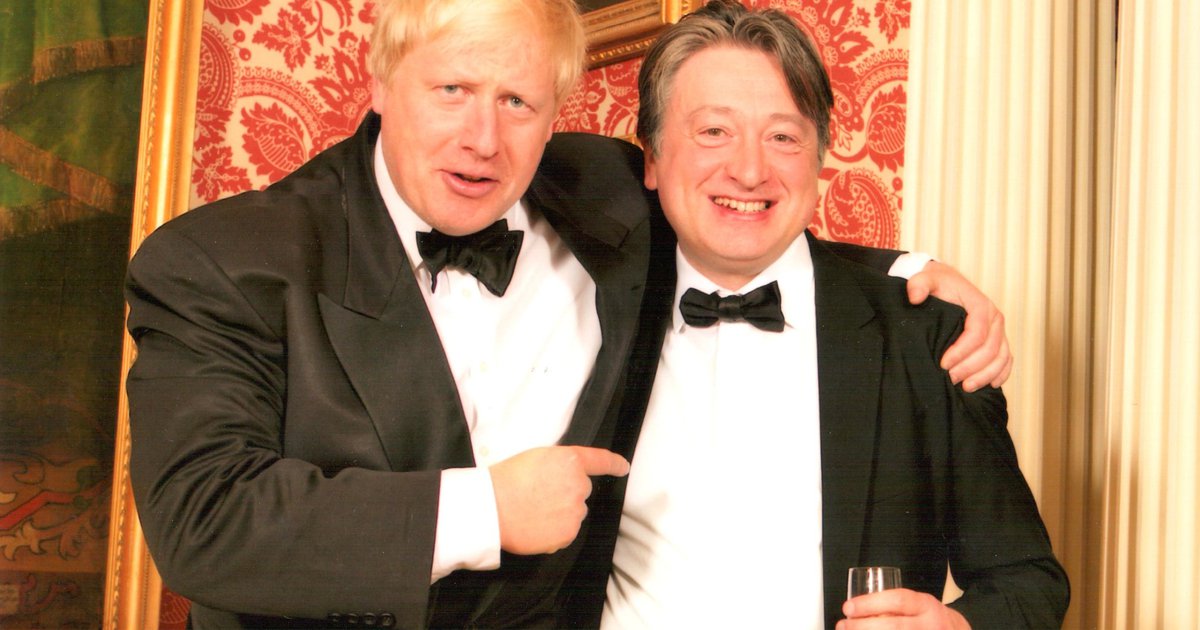
The people have had no say in the matter and no control
over what has been done in the mafia-style shenanigans of the cartel party
system.
It is reported that Russian officials angrily rejected any conclusions of the report that alleged Russia's interference or hacking, accusing Britain of taking a "leading role in Russophobia" and seeking to distract from a loss of status due to the Brexit crisis
The spin, and what the monopoly-controlled media are promoting, is that it proves that Russia is interfering in elections and referenda in Britain. But even a cursory investigation of what has been uncovered by the report gives the lie to this promotion. For sure, Russian oligarchs are muscling in, taking advantage of the destruction of the old norms of the politics of the powers-that-be, and not just paying the Tory Party hoping for advantage, but joining in the mafia-style shenanigans of the cartel party system, with all its opportunities for corruption, money laundering, money lending to the government, and on a wide scale the pay-the-rich schemes.
Of course, it is not just the Russian oligarchs but the global oligarchs that are finagling to get their interests served. One is supposed to think, however, of Putin and the Kremlin intervening for their own advantage, whereas the most that is really exposed is the so-called "Russian oligarchs with links to the Kremlin". As for hacking, as explained for example by Craig Murray, leaving a "smoking gun" of Cyrillic characters could only be the work of US or British intelligence agencies. There is no smoke; there is not even a gun. As Craig Murray says, "Even at the height of the Cold War, we never saw such a barrage of unprovable accusations levelled at Russia through the media by 'security service sources'."
Craig Murray continues: "Wikileaks Vault 7 release of CIA material showed the specific programmes for the CIA in how to leave clues to make a leak look like it came from Russia. This irrefutable evidence that the CIA do computer hacks with apparent Russian 'fingerprints' deliberately left, like little bits of Cyrillic script, is an absolutely classic example of a fact that everybody working in the mainstream media knows to be true, but which they all contrive never to mention."
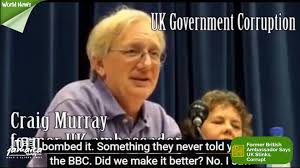
To continue quoting Craig Murray: "My own view is that there are malign Russian forces attempting to act on government in the UK and the USA, but they are not nearly as powerful as the malign British and American forces acting on their own governments. The truth is that the world is under the increasing control of a global elite of billionaires, to whom nationality is irrelevant and national governments are tools to be manipulated. Russia is not attempting to buy corrupt political influence on behalf of the Russian people, who are decent folk every bit as exploited by the ultra wealthy as you or I. Russian billionaires are, just like billionaires everywhere, attempting to game global political, commercial and social structures in their personal interest."
It could be said that what is being shown is not so much a case of competing social systems as of competing oligarchs on a world scale.
In his concluding paragraph, Craig Murray points out: "Finally, do not forget that there is a massive armaments industry and a massive security industry all dependent on having an 'enemy'. Powerful people make money from this Russophobia. Expect much more of it. There is money in a Cold War." Or, it could be said, in this post-Cold War period, it is financial vultures rather than geopolitical players that are marauding the world.
Among the unwarranted conclusions which are being drawn by the ruling elites is that of giving more powers to the intelligence services, which involves attempting to keep the people's resistance in check also. It is corruption and destruction of the social fabric raised to a way of life for the ruling elites. To pursue this way of life, the arbitrary powers of the state must be strengthened, and this is what we are seeing. In the course of this, it is the people's resistance which the government is seeking to criminalise, not the corruption of the oligarchs and indeed themselves. The report seeks to disorientate opposition to the government, a trap into which the parliamentary Opposition is only too willing to fall, by putting up Putin and the Kremlin as the straw-men.
The hand of corruption and acting with impunity can also be seen in such government spending as its investment in the OneWeb satellite firm, a bankrupt satellite operator in which, according to Downing Street, the government is to participate in a $500 million deal to rescue it. Business Secretary Alok Sharma said that this deal offers "strategic geopolitical opportunities".
And on July 17, the Good Law Project issued proceedings in the High Court against Michael Gove, alleging breaches of procurement law and apparent bias in the grant of a £500,000 contract to his long-standing associates "Public First" to promote "free schools". It is crowdfunding the challenge. The awarding of contracts to companies to supply PPE equipment during the pandemic without the usual norms of competitive tender has also become a scandal. For example, the government awarded PestFix a £32 million contract to supply surgical gowns. PestFix is not a manufacturer but an intermediary, whose role was simply to order the gowns from China.
The people have had no say in the matter and no control over what has been done. A new direction is needed for society and the economy which would prohibit the global oligarchs from taking value out of the economy and prohibit all levels of government from going into debt to private interests. It is necessary to move on to the New. Working people demand public enterprise and governments under their control, organised to serve the public interest not certain privileged private interests.
No to corruption! Government must be accountable to the public! On to democratic renewal!
Footnote
As a footnote, it may be noted that the "first phase" of an "independent" policing review into the rise of "confrontational protests" in Britain, especially the upsurges following the killing of George Floyd, has been led by Michael Barber, a former education adviser to Tony Blair, and the author of the books "Instruction to Deliver" and "How to Run a Government", encapsulating the doctrine of "deliverology". Michael Barber is also the chair of higher education regulator the Office for Students. The hallmark of Barber's style is to concentrate power in the hands of the Prime Minister's special advisors with a lack of accountability to any public authority, going hand in hand with privatisation and neo-liberal restructuring of the state to serve private interests.

Minister for the Cabinet Office and Chancellor of the Duchy of Lancaster, Michael Gove, gave the 56th Ditchley Annual Lecture [1] on June 27, on the subject of "The privilege of public service" [2].
Gove's thesis is that there is a need for change. His argument is that previous ruling elites have failed, particularly over policy and judgement, as they have ignored the concerns of their "fellow citizens". As a result, "faith in conventional political parties, their leadership and their allies in business has been broken". His solution, what he means by change, is to reconnect the elites with the masses, change the make-up of the ruling elites, and their methods, so as to restore that faith.
Gove immediately begins by taking up the issue of the New versus the Old. Throughout, he uses the 1930s as a historical parallel, quoting the Italian communist Antonio Gramsci, who said at the time: "The crisis consists precisely of the fact that the inherited is dying - and the new cannot be born; in this interregnum a great variety of morbid symptoms appear." Gove describes the Old at that time as "aristocratic liberalism" and the New as "liberal democratic nation states with welfare systems", in other words, the coming social democratic era.
His parallel is that the present is similarly a time of "morbid symptoms" afflicting the body politic. Speaking of the thirties, Gove speaks of the traditional political and party structures breaking down. The present is different, he says, but likewise the models that have been inherited from the past are crumbling. He refers to the failure of the political compact, otherwise known as a covenant, between the people and their leaders: there is a deep sense of disenchantment, he says, on the part of many citizens, with a political system that they feel has failed them. What the compact leaders have offered is broken in their eyes.
It is worth noting in this respect his constant qualification of the failure of the arrangements that it is one of appearance: it is what citizens "feel", it is "in their eyes". In other words, the sickness of the body politic is one of how citizens perceive things. He talks about the compact as being about "trust": trust that the leaders are the best, trust that we have your best interest at heart, trust that we will deliver. It is in people's eyes that this "lack of trust" exists.
Gove explains the cause of the sickness in the gap between the elite and the masses, whom he calls the "governed and employed". However, the elite for Gove does not have its basis in class division, but is an elite with certain skills or qualifications, or professional mobility, and having different values. It is implicit in Gove's presenting of matters that society has naturally polarised itself into a natural governing and employing elite versus a governed and employed mass. Always the "meritocrat", he accepts this natural aristocracy, this natural order, but it has brought problems, which could be said to be an alternative way to phrase his whole thesis. His argument is that this natural elite has ended up with different values and has become disconnected from the masses.
He explicitly says, then, that there are crises in authority, crises which began during the first decade of the 2000s, the turning point being the financial crisis in 2008. The essence of these crises in authority is a growing gap in wealth and attitudes, according to Gove. He further alludes to the conditions against which authority is struggling to operate. He identifies the scientific and technological revolution; ever present, just hinted at in the background, is the obsession with lack of control.
Continuing to draw parallels with thirties, Gove says that the problems of that time inspired change, significantly using the phrase "national and social solidarity".
He asserts that we need to follow a constructive, progressive, inclusive path, as was exemplified by F D Roosevelt. FDR managed to save capitalism, restore faith in democracy, indeed extend its dominion, renovate the reputation of government, he says. He proceeds to outline various pieces of his programme for change, hung off the various things that, in his rendering, Roosevelt carried out.
He talks about how government is distant from the people and inward-looking, putting forward various truisms. He states his intent to relocate various Whitehall departments, and speaks of increased devolution to the regions. His vision is for the group of elite decision-makers in government to be "broader and deeper", by drawing from a wider "talent pool". One would think he was talking about a company recruiting its senior managers. Yet, says Gove without a hint of irony, "we should be a pro-worker, pro-public servant People's Government".
To restore faith in government, he says, the challenge is to change how government itself works, by reorganising the institutions. At the heart of the programme must be a focus on what works, he says. Despite the academic tone, the passing references to "bodies politic" and the like, there is no theory of governance - Gove reveals the pure pragmatism, the "deliverology" of his whole outlook. In this context, he raises the need for evaluating data rigorously and having metrics, and for the Civil Service to hire those with mathematical proficiency. His model for the Civil Service and the entire government is some rosy view of a dynamic Silicon Valley tech firm.
Hence there needs to be a "bias towards experimentation", he tells us. "We need, as a Government, to create the space for the experimental and to acknowledge we won't always achieve perfection on Day One." Gove wants to open a space for tearing up norms and arrangements under the signboard of innovation. Just like the Coalition Government ten years ago, this government is presenting itself as a great reforming government. Just like the Coalition, it is carrying out shock and awe.
The context takes us back to Gove's thesis. Rather than recognising the right of all citizens to fully participate in decision-making, and elaborating a programme to guarantee this right, Gove speaks instead of the "privilege of public service", by which he means that "public service" - being part of the mechanisms of government - is the privilege of a decision-making elite. His whole argument is that previous elites have failed, and this has caused "morbid symptoms". The privilege, as he paints it, "comes from knowing that those of us in government have the chance every day to make a difference". They are the ones looking after things on behalf of the masses, the "governed and employed". With this privilege comes a duty to know if what they are doing is "genuinely transformative". Can they prove that the various changes of arrangements "have made clear, demonstrable, measurable, improvements to the lives of others"?
There is no fidelity to the human relations, which point to the need for empowerment. There is just effectiveness to deliver, there is just pragmatism. It is left unsaid that this pragmatism is enforced by the increasingly naked police powers of the state. The truth is what works is backed up by might makes right.
There are indeed "morbid symptoms", and, yes, the old mechanisms and political covenant are broken, fundamentally so. The issue is not to fix them, but to replace them entirely. The agenda expressed by Gove's speech - a speech full of truisms and distortions intended to block people from developing an independent outlook - is thoroughly backward and dangerous. The direction being pushed by Gove and others is of centralisation of power in the form of rule by a small elite, and this must be rejected.
Particularly in the present, working people, the "governed and employed", are learning from direct experience in simply keeping things running in times of all-sided crisis that, in the face of the irrationality and arbitrariness coming from the existing authority, they can no longer entrust that authority to acting in their name. They cannot afford to entrust their fate to the self-serving ruling class. Rather than Gove's so-called duty of the privileged elite, people are concerned with their own social responsibility, which is to hold that existing authority to account and acquire for themselves the power to become the new authority with the right to speak and to decide directly.
References
[1] The Ditchley organisation describes itself as follows: "Ditchley was founded as a privately-funded charity in 1958 by the philanthropist Sir David Wills in order to support the Transatlantic Alliance between the United States and Europe by bringing decision makers and experts together in a unique and inspiring setting. He was moved to act by painful memories of the Second World War and the dangers of the Cold War. Ditchley Park is an extraordinary place, but our story is most of all about people and what they can achieve when they work together."
It explains: "The Chairman of the Ditchley Foundation is Jonathan, Lord Hill, formerly EU finance commissioner and Leader of the House of Lords. Previous chairmen have included George, Lord Robertson, former NATO Secretary General and Secretary of State for Defence and Sir John Major, former Prime Minister.... The current Ditchley team is led by the director, James Arroyo OBE."
Of its guiding philosophy, it says: "The philosopher Isaiah Berlin was an early supporter of Ditchley and had a strong influence on Ditchley's approach, for example through his conception of liberty as a process as well as a state."
See: https://www.ditchley.com/our-story
[2] The full text of the speech, published on July 1 by the Cabinet Office, is available at: https://www.gov.uk/government/speeches/the-privilege-of-public-service-given-as-the-ditchley-annual-lecture
The speech can also be viewed at: https://youtu.be/KJDvMwBd-_M
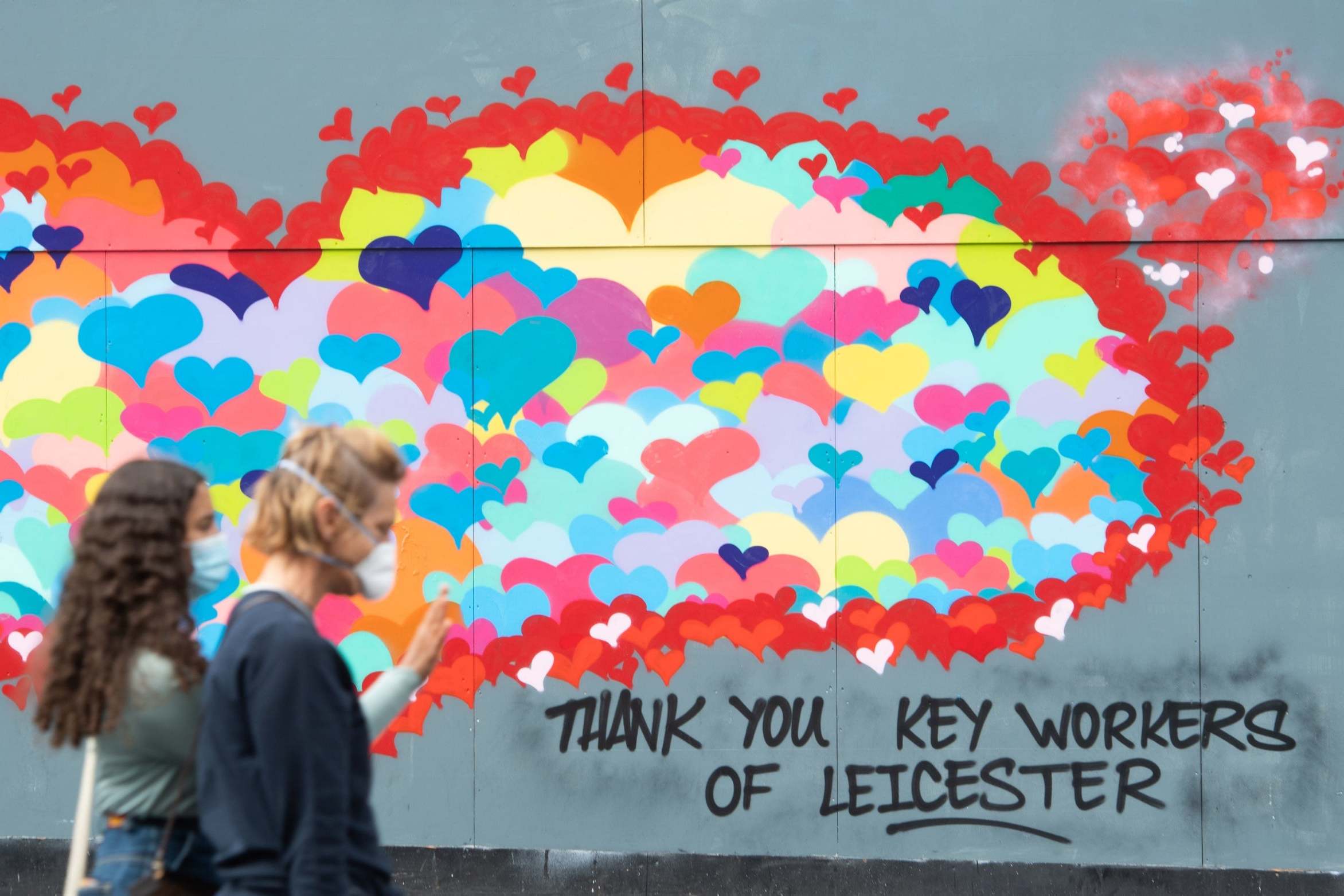
Leicester
As Britain imposes lockdown on European countries affecting vacations in Europe, Britain itself has local spikes with which to contend. In the latest announcement, local lockdowns have imposed in Manchester and other regions in the north of England. One of the causes has been the conditions of low-paid workers in textiles, food and parcel packaging, and processing, besides, it must be said, the cavalier attitude of the government to the safety of working people.
Many of the factories and processing plants are long-established, but work with Victorian conditions such as overcrowding, poor light and intolerable temperatures.
Today, coronavirus has highlighted the deficit in workers' conditions. Many workers are from abroad on less than minimum wages, not unionised, unregistered and in fear of the authorities. At the same time, they are doing work of utmost necessity, essential during the pandemic, and have been applauded for making sure the supply of food and clothing is secure and sustained.
CBS Packaging had to take the step of shutting down temporarily after Sandwell borough saw a "serious rise" in Covid-19 cases recently, when 49 of 117 staff, a third of the workforce, tested positive. The factory will shut for a total of 14 days, while workers self-isolate at home.
Earlier, Dr Lisa McNally, Sandwell Council's Director of Public Health, said 40 coronavirus cases in nearby Smethwick in seven days of data was "10 times higher" than previous weeks. There are concerns Covid-19 could be spread in Smethwick and Walsall.
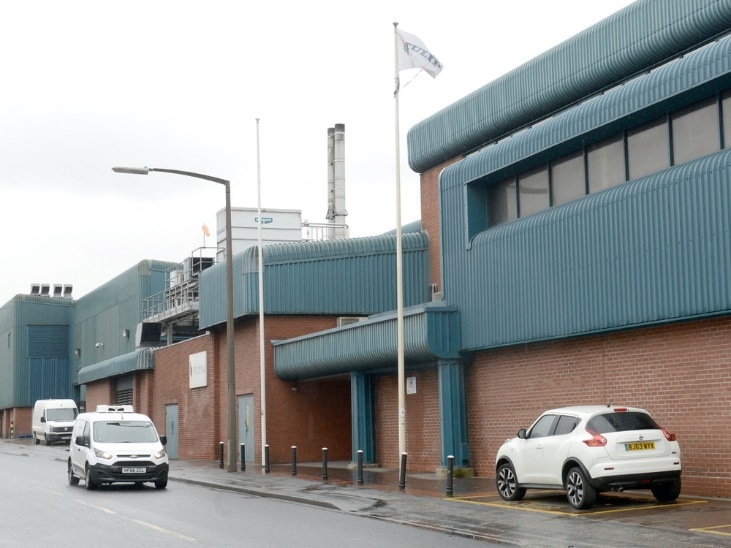
The Tulip factory in Tipton
According to the latest government figures, 1,682 people have tested positive for coronavirus in Sandwell since the pandemic began while 5,881 people have tested positive across the four Black Country boroughs.
CBS is not the first Black Country firm to be badly hit by coronavirus - last month around a dozen staff tested positive at Tulip Foods in Tipton. The company has also confirmed it will close its fresh pork manufacturing site, workers were told. The company had already decided in March that it was looking at closing the site where 600 people work.
A joint statement on the Covid-19 cases was also issued by Tulip, health organisations and the local authority, which said: "Public Health England Midlands is working with Sandwell Council, the HSE and local NHS colleagues, to support meat processing business Tulip Ltd, following confirmation of some cases of Covid-19 in staff members. In line with NHS guidance, any affected individuals are being asked to self-isolate at home for seven days, with members of their households to isolate for 14 days."
The company have now said: "We are working with PHE Midlands to arrange swab testing for a sample group in one particular area of production before deciding upon the need for any further screening. As soon as we receive test results, we will liaise with health partners to assess whether further actions are necessary."
One worker, who did not wish to be identified, told local press, "At present there have been around 12 to15 reported positive Covid-19 cases. We are all worried about our safety there but no one seems to be concerned about the ever-increasing positive cases."
Workers are becoming unionised and organised to change their conditions and pay. Shop stewards and representatives are being elected and are widening their organisation. Personal protection, social distancing and general working conditions must be improved immediately in all workplaces. At the same time, workers are right to be on their guard against the authorities who are attempting to resolve problems at factories using police powers. Workers must be constantly checked and outbreaks tracked and traced in the community to protect themselves, their families and the rest of the community.
[Sources: Express and Star, BBC]
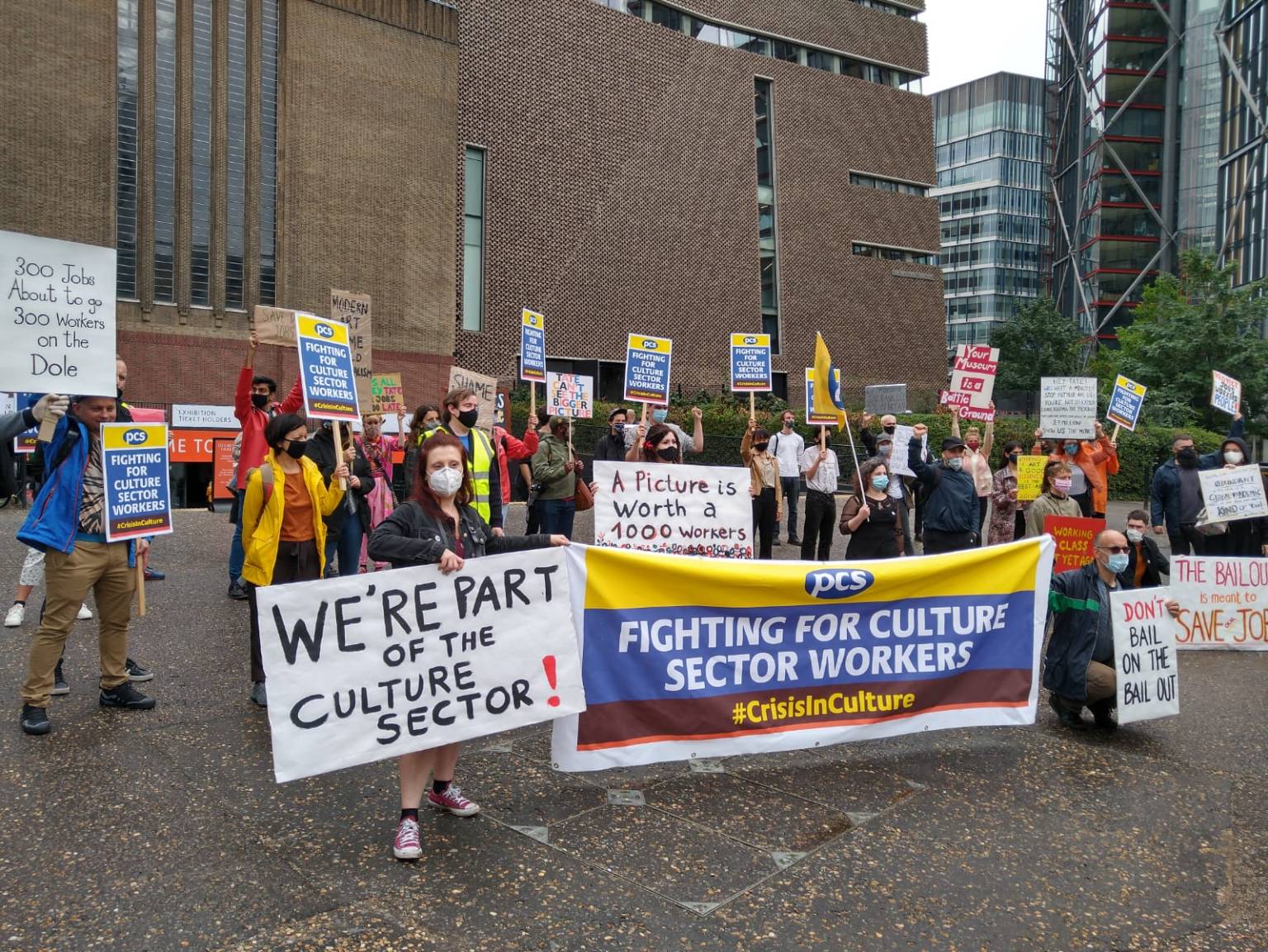
Workers protesting outside Tate Modern against
redundancies
As London art gallery the Tate Modern reopened, PCS members and supporters protested on July 27 over plans to cut more than 200 jobs.
The 9.30am protest, one of a series of actions taken by PCS, was part of the growing dispute over job losses at Tate Enterprise, where more than 200 workers are at risk of redundancy, across the most diverse teams at the Tate. Tate members are currently being balloted for strike action over the plans.
The protest, which was scheduled to coincide with the gallery's reopening, highlighted for visitors and others the huge job losses at both the Tate and other cultural institutions such as the Southbank Centre, Historic Royal Palaces and the National Theatre.
PCS general secretary Mark Serwotka said: "Today's protest shows our members' determination to save jobs and protect a culturally iconic site. Tate management have launched a massive attack on our members and they have no choice but to ballot for strike action to save their jobs.
"It is staggering that after receiving a £7m grant from the government, Tate has decided to treat loyal staff, who support some of our country's most important cultural sites, with redundancy. We will support our members in whatever they decide to do, including prolonged strike action."
The union has welcomed the government's investment of £1.57 billion into the culture sector, of which Tate is expecting to receive £7 million, but says that, with the scale of the redundancies across the sector, it falls woefully short of the needs of vital cultural institutions and those who work in them.
A statement from the union said: "We are determined, however, that whatever money is made available must be used to safeguard jobs and protect those staff that make our cultural institutions some of the most successful in the world.
"Culture sector workers are an intrinsic part of these institutions and contribute enormously to the fabric of culture and heritage in the UK. We are asking the Tate for an investment of just 10% of the additional money to save hundreds of jobs at Tate Enterprise, protect the poorest-paid staff, and invest in their most diverse teams. This would be a good start in showing that black lives, and black and minority ethnic workers, truly matter to the Tate.
"Join our socially-distanced protests at Tate Modern, starting at 9.30am in support of our members, but also workers across the culture and heritage sector. We must fight to preserve jobs and the diversity and vibrancy of our sector."
(Union News)
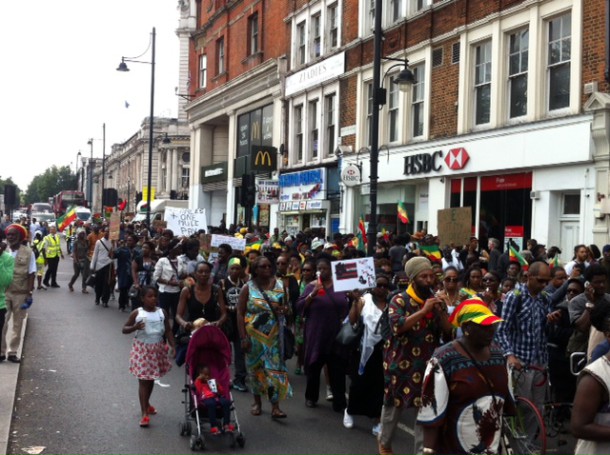
Brixton will once again be the starting point for the
annual march organised by the Stop The Maangamizi Campaign and the Afrikan
Emancipation Day Reparations March Committee to demand
reparations
Brixton will once again be the starting point for the annual march organised by the Stop The Maangamizi Campaign and the Afrikan Emancipation Day Reparations March Committee to demand reparations as a start to the process of repairing the vast damage to human beings and their natural and social environment by the enslavement of Africans over centuries. The event is also backed by Extinction Rebellion (XR) supporters.
This is the seventh Afrikan Emancipation Day Reparations March. It is due to assemble in Brixton at 9am on August 1, and organisers say this one will involve "locking down" Brixton to enforce a traffic-free zone on Brixton Road "in a little contribution to lowering pollution levels in the area".
Esther Stanford-Xosei, spokesperson for the Afrikan Emancipation Day Reparations March Committee, and coordinator-general of the Stop the Maangamizi: We Charge Genocide/Ecocide Campaign, said the theme of this year's march was uniting for survival as the Maangamizi - the continuing mass destruction caused by the enslavement of African people - represents ecocide.
"Our people have been prevented from breathing for centuries," she said.
One of the speakers at an online conference on July 21 was Lambeth Green Party councillor Scott Ainslie, who instigated the full-council resolution that commits it to back the campaign. He said that he supported the movement because it is the right thing to do, and the time is right. Social justice and environmental justice were two sides of the same coin, he said.
Lambeth council is, so far, the only local authority to back unequivocally the demands of the campaign, including a call for an all-party Parliamentary Commission of Inquiry for Truth and Reparatory Justice to study the impact of the United Kingdom's transatlantic traffic in enslaved Africans on social, political and economic life within the UK and the rest of the world, and for reparations taking into consideration proposals in accordance with the United Nations Framework on Reparations.
Why We March on August 1
The Afrikan Emancipation Day Reparations March Committee

The Afrikan Emancipation Day Reparations March Committee formed in 2015 continues to build on work of the organisers of the first Reparations March RMUK and other supporting organisations on August 1, 2014, after such organisers decided that would be a one-off event. Various community members and their constituencies at the time insisted that they wanted to March to continue the efforts that had been made to more visibly bring to public consciousness awareness of a Reparations Movement.
The 1st of August was originally chosen as the day of the Reparations March because it is the officially recognised "Emancipation Day", marking the passing of the Act for the Abolition of slavery throughout the British Colonies; for promoting the industry of the manumitted slaves; and for compensating the persons hitherto entitled to the service of such slaves (also known as the Slavery Abolition Act) on August 1, 1833, and took effect August 1, 1834. The significance of this date in history is that it is the date that after all the years of resistance by chattelised Afrikans, torn away from our Motherland, Britain and its fellow European enslavers of Afrikan people were compelled to recognise that they could no longer continue to enslave us without severe consequences. It therefore represents a symbolic day recognising our refusal to accept enslavement, in every manner, including its present-day manifestations and to remind ourselves of the need for our true emancipation, which wi ll not occur without holistic Reparatory Justice.
Contrary to popular belief, however, the Slavery Abolition Act did not free Afrikans who were then unjustly considered to be the legal property of Britain's enslaving class. In fact, the act contained a provision for £20 million financial compensation to the enslavers, by the British taxpayer, for the loss of their so-called "property". That sum represented 40% of the total government expenditure for 1834, the modern equivalent of between £16bn and £17bn and represented the largest bailout in British history until the bailout of the banks in 2009. It was the British Houses of Parliament, which in this unjust piece of legislation, upheld the notion that the Afrikan enslaved and their descendants were not human, but property and determined that our people in the Caribbean were assessed as having a market value of £47 million.
The British Parliament also determined that enslaved Afrikans in British colonies would receive nothing. Instead they were forced, through the provision of this unjust law, to pay the remaining £27 million costs for their so-called emancipation by providing 45 hours of unpaid labour each week for their former "masters", for a further four years after the passing of the Abolition Act. Clearly, the British state cemented this legalised form of injustice by forcing the enslaved to pay part of the costs for their legalised "manumission". It was recently discovered that up until 2015 our people and other members of the British public were paying taxes which went into paying off the "debt" that was incurred by the British Government as a result of compensating European enslavers with the passing of the Slavery Abolition Act.

Fast forward to the contemporary era, the Afrikan Emancipation Day Reparations March has aims and are the reasons why we march on August 1. Please visit www.reparationsmarch.org to familiarise yourself with the aims.
The March is supposed to be a culmination of the work that people are engaged in all year round on reparations, which is represented in the messages and banners for the March and show of strength, but unfortunately it is still seen as a one-day event with no attention paid to reparations/activism the other 364 days of the year. August 1 allows us to tie in and reclaim a day popularly known and commemorated as "Emancipation Day" and reclaim it as a "Reparations Day", which enables our people also living in "former British colonies" to engage with it too.
Many former colonies have August 1 as a public holiday as granted by their governments, often on the basis of activists on the ground who feel it is importance to commemorate the struggles of our Ancestors for emancipation. The Afrikan Emancipation Day Reparations March Committee (AEDRMC) is not advocating a state granted public holiday and feel there is more power in disruption in London to state agencies and the economy as well as the increase in visibility to international tourists during the holiday season. We do not advocate state recognition of a day where they will as they always do, redefine the narrative, hijack and take credit for the day! Please note that the petition gets the same response whether MPs are sitting or not. The disruption to London happens whether MPs are there or not! [...]
We in the AEDRMC emphasize that the March is not the whole Reparations Movement, but only an aspect of it in terms of a street protest that happens annually. It is important that other initiatives that other groups, organisations and individuals in the Afrikan Heritage Community are showcased on August 1, as stipulated in one of the aims of the March; hence why we have chosen the theme STOP TERMINATING OUR PEOPLE: REDRESSING YOUTH MENTICIDE/ECOCIDE for this year's theme.
The challenge is being put to our people to bring forth and promote the work they have been doing on reparations all year round. It is easy to see the inadequacies in what other people do but far more transformative when we ourselves focus on the change that we are making, individually and collectively.
Sinn Féin Newsroom, July 26, 2020

John Brady
Sinn Féin spokesperson on Foreign Affairs and Defence John Brady expressed his anger at the revelation that a Killybegs-registered trawler, the Marliona, was confronted by a British Navy vessel and ordered away from a fishing area off the Donegal coast.
The Wicklow TD accused the British Navy of arrogance of the highest order and of once again endangering Irish fishing vessels.
Speaking today, Teachta Brady said: "On one level, we have the outrageous scenario of a foreign power ordering an Irish vessel out of Irish waters. On the other, we have a situation where a British warship was engaged in a joint operation with a British submarine.
"The disregard for Irish sovereignty is arrogance of the highest order. But, alongside this we have the endangerment of Irish fishing vessels and their crews by a British submarine.

The Marliona
"I thought that we had left this carry-on behind with the Cold War.
"For decades, British submarines have infringed on Irish sovereign waters, leading to tragedy and loss of life when submarines have got caught up in fishing nets and pulled trawlers under.
"It is staggering and unacceptable that this flagrant disregard for the safety of Irish fishing crews is continuing. This cannot be allowed to stand.
"I will ensure that this incident will not be allowed to be swept under the carpet. We need answers as to why this has been allowed to happen.
"I understand that the Department of Foreign Affairs has launched an investigation into the incident, and I will be in contact with the Minister to ensure that the government's response reflects the seriousness of the matter.
"I also want to commend the response of the Irish Navy, which ordered Irish vessels to the area to ensure the safety of the fishing vessel in question.
"This incident underlines the need to end the running down of the country's defence forces and naval service by government."
Receive Workers'
Weekly E-mail Edition: It
is free to subscribe to the e-mail edition
We encourage all those who support the work of RCPB(ML) to also support it
financially:
Donate to
RCPB(ML)
Workers' Weekly is the weekly on
line newspaper of the
Revolutionary Communist Party of Britain (Marxist-Leninist)
Website:
http://www.rcpbml.org.uk
E-mail:
office@rcpbml.org.uk
170, Wandsworth Road, London, SW8 2LA.
Phone: 020 7627 0599: